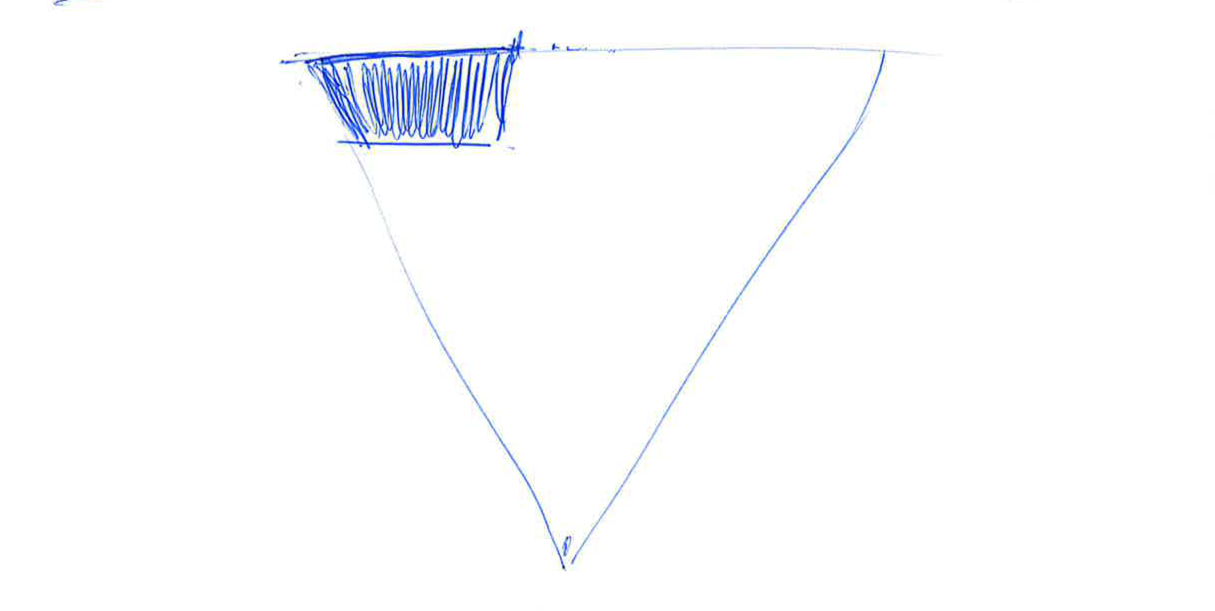An algorithm, drawn by a 47-year-old male musician and music teacher in Switzerland.

The second task, and then the last one, how does an algorithm work? To draw a sketch of that, too. Ok [laughs]. Then you are welcome to explain your thought process while you are drawing. Yeah, that's funny. I have very little to do with math since I left school. And algorithm is used a lot, but everyone uses that word: I honestly can't imagine anything exactly, what happens. In connection with the Internet, that data is collected and calculated, that somehow what happens most is the most important thing. Somehow like that. Can you somehow visualize that? I imagine it in the form of a pyramid or something like that, you would have to visualize it like that. But maybe even... That's demanding, what you're asking for here [laughs]. Because it's the frequency plus the density, so to speak, that should increase in this way. It gets wider... Yes, good. But as I said, you can also paraphrase it with words so that it becomes clearer. So what I mean by that, I'm going to stay in the context of the Internet, when a lot of people click on the same thing, it takes a very broad section of all this possible up there. There may be a lot of small sections, there may be less of them in the algorithm, the algorithm understands or calculates that this is less in demand. Maybe you could draw it with points and I don't know if we... Could you even illustrate it with a concrete example? Are you saying... Yes, for example, what would be in great demand or less? The Internet is overloading us, I just realized. So what is very often done is shopping over the Internet. But there are already algorithms that decide how often a sports shoe is bought or how often a pair of underwear. That has only to do with it...Well, I now assume that the sports shoe is a wide and also a fat bar. Because very many, very often in a large quantity is bought. For me this is the number of people and the frequency of what is used. There will probably be a lot of people looking, what kind of shoes there are and probably a lot of people buying shoes. This for example. What I just read again recently is that pornography is an extremely large part of the internet. That means I suppose that it also works with algorithms. And what does the algorithm do in these, now with the shoe for example? Well, in my personal opinion, I see it like this. For example, if I have ordered a fan on Galaxus, the next time I open a website somewhere, there will be an advertisement for fans. And you see, it has an algorithm? I assume that the algorithm calculates: Okay, he already ordered one. So maybe he's interested in this kind of product. Maybe the algorithm doesn't understand that I already have a product and I don't need it anymore. So that's that, which relates to me personally. Okay, perfect. And otherwise I think an algorithm will determine If so many people are interested in this product, it's on YouTube, for example: car commercials. There are many people who are interested in cars, which means that very often car ads appear before a video. That's right, or that it's also algorithms that decide what kind of advertising is shown, so that it reaches as many people as possible. Where does this knowledge about algorithms come from? Well, what you just said. Where did you learn about algorithms? Actually mostly from the media, newspapers. I originally studied music, where algorithms didn't really play a role in that sense. It was other mathematical things, like the Fibonacci series or something. Maybe it's already an algorithm, I wouldn't even know that now. I'm not allowed to say anything [laughs]. [laughs] But, you know, I really couldn't explain what an algorithm is. I really couldn't. And in everyday life you encounter it just like you said on the internet, that's so. Are you aware of this? No, it's not as if I would think, "Ah, this is another algorithm". But when I am asked, I understand why this or that happens so often on the net.